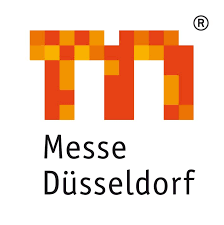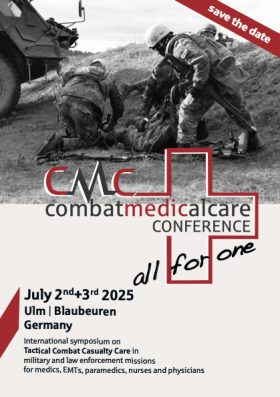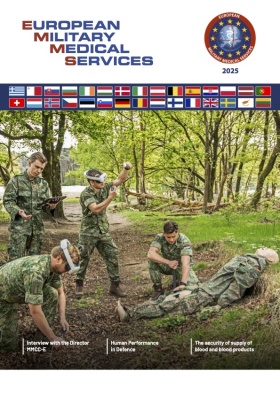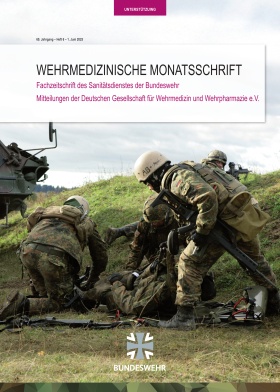
Report: Brigadier General Dr Stefan Kowitz, MD
On track towards FOC
The Director of the Multinational Medical Coordination Center/ European Medical Command (MMCC/EMC), Brigadier General Dr. Stefan Kowitz, reflects upon a successful year of growth and the advancement of a multitude of projects undertaken by the organization located in Koblenz. For the next few months, its primary focus is the establishment of the situation centre, serving as a coordination centre and broker for medical information and expertise at the operational level.
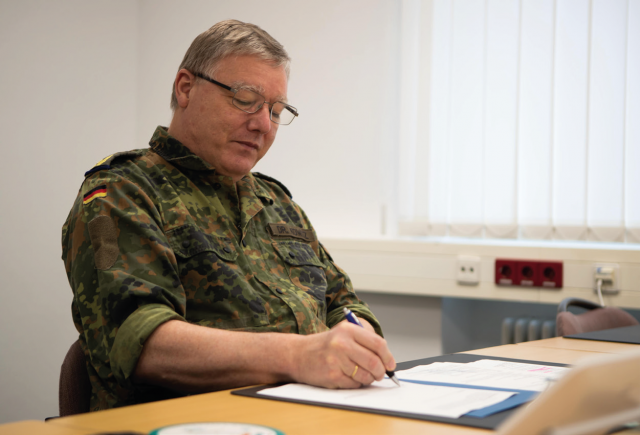 BG Dr. Stefan Kowitz/© Bundeswehr/Laymann
BG Dr. Stefan Kowitz/© Bundeswehr/Laymann
Two roots and one entity
In 2014, during the Wales Summit, the Heads of States of the NATO member nations endorsed the “Framework Nations Concept” (FNC). As an achievement of the medical FNC activities, eight nations started an initiative called Multinational Medical Coordination Centre (MMCC) in May 2017 - under the framework of the Bundeswehr Medical Service. The development of the MMCC is in line with MC 326/4 - NATO PRINCIPLES AND POLICIES OF MEDICAL SUPPORT (Chapter 1, page 4), as “management of medical shortfalls requires sustainable effort and the continuous attention of NATO and national political and military decision makers. NATO however can only provide the framework for effective cooperation, while the primary role and responsibility for shortfall management rests with the Nations”.
At the end of 2017, the Council of the European Union established the Permanent Structured Cooperation – (PESCO). The project called the ‘European Medical Command’ was one of the first PESCO projects agreed upon in 2018. The Bundeswehr Medical Service assume primary responsibility for the development of the project.
Both projects address long lasting critical shortfalls in the medical environment and fill the lack of a missing medical coordination and support element at operational level.
The goals are to increase:
• medical readiness and resilience,
• medical civil-military interaction, and
• medical cooperation between NATO and EU.
At the 49th Plenary of the Committee of Chiefs of Military Medical Services in NATO (COMEDS) in May 2018, the Chiefs of the Medical Services declared: “…to maximize coherence and economy of effort and to avoid duplication, both initiatives should merge into one entity…”
Born in NATO - our slogan is: “Two Roots - One Team - One Capability;” to combine and synchronize Medical Support efforts. While understood for quite some time, the CORONA pandemic further highlighted the strong interdependencies between the civilian and military medical stakeholders in all NATO and EU nations.
EU/NATO Joint Declaration and Participating Nations
The goals, tasks, and processes of both projects, the Framework Nation Concept (MMCC) and the Permanent Structured Cooperation (EMC) are highly similar and comparable, although both serve two different institutions. To conform with the 2016 NATO/EU Joint Declaration and the 2018 COMEDS statement, the MMCC/EMC was established as one entity supporting both NATO and EU matters.
MMCC/EMC support the following fields of work of the EU/NATO Joint Declaration:
• Medical Situational Awareness
• Medical Crisis Response
• Bolstering Medical Resilience
• Medical Cyber Security
• Support in Exercises.
Declared by the 14 participating nations to be at Initial Operational Capability (IOC) on 4th September 2019, the MMCC/EMC will be fully operational by the end of 2021. As a dynamic and innovative institution, 18 participating nations (BEL, CZE, DEU, EST, ESP, FRA, GBR, GRC, HUN, ITA, LUX, LTU, NLD, NOR, POL, ROU, SVK, SWE) contribute to the expertise of the MMCC/EMC. Based on the FNC and PESCO projects, additional nations are in an observing position (AUT, FIN, PRT). More than 80 percent of the participating nations are NATO and EU member states.
MMCC/EMC Koblenz, Germany:
well-connected – short ways
The MMCC/EMC is located in the western part of Middle Germany - in Koblenz, a Roman military post established by Drusus around 8 B.C. Its name originates from the Latin (ad) cōnfluentēs, meaning “at the confluence” of the river Mosel into the Rhine. The spot in which the two rivers come together symbolizes the unification of Germany and is known as the “German Corner” for that reason.
The MMCC/EMC is easily accessible and conveniently located. Only a two-hour car-ride from the NATO HQs at Brussels, Koblenz is also only 200 km northeast of Gadheim, the new geographical centre of the European Union. Additionally, U.S. forces headquarters and installations to include United States European Command (USEUCOM), United States Army in Europe and Africa (USAREUR-AF), Ramstein Airbase and Regional Health Command Europe (RHCE) are in close proximity
Governance & Structure: Seven nations provide staff on a permanent way
During the last 18 months since IOC, we increased our personnel from seven to nearly 30. Key personnel include a Deputy Director for EU matters (provided by FRANCE) and a Deputy Director for NATO matters (provided by Netherlands) who assumed their duties and are now responsible for the respective EU or NATO-only projects.
Since March 2021, we established a liaison offi cer from US Army Europe and Africa Command (USAREUR-AF) who works the MMCC/ EMC once a week for the next 12 months. In autumn, BEL and a HUN both will send a medical offi cer as well. So seven nations, including Germany, are providing personnel on a permanent basis. Many thanks to the medical services of the armed forces of Belgium, France, Germany, Hungary, Luxembourg, the Netherlands and the USA, who all are providing staff members on a permanent basis for the MMCC/EMC. For further information, the structure of our entity is depicted on the following chart:
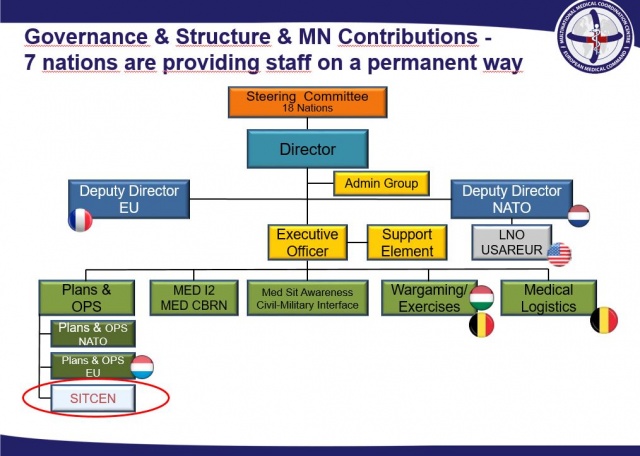
The MMCC/EMC Steering Committee provides the governance and tasking authority of the participating nations and in terms of NATO and EU regulations, and acts together with representatives of the participating nations in conjunction with the European Military Staff (EUMS) / NATO International Military Staff (IMS) / Supreme Headquarters Allied Powers Europe (SHAPE) / Allied Command Transition (ACT) Medical Advisors / COMEDS LNO as a permanent observer. If tasks and the classification requirements allow, all branches of the MMCC/EMC work jointly. The deputy directors for NATO and EU matters are responsible for the governance of their respective projects and processes. NATO or EU-only tasks are processed by respective personal from NATO or EU nations. Although MMCC/ EMC is one entity, the project management of NATO or EU-only related tasks comply with two distinct delineated processes and documentations.
Mission - Values
Our mission is supporting:
• EU and NATO Military Medical Services and HQs,
• coordination of medical tasks for rapid reinforcement for Europe including medical situational awareness,
• expansion of the civil-military medical interface,
• strategic patient flow management out of the JOA,
• coordinated procurement of medical material.
We facilitate the provision of military medical operational expertise for EU and NATO, and we support the harmonisation of civilian and military efforts to enhance the medical resilience. As a benefit of this value, the MMCC/EMC is contributing with operational knowledge to increase interoperability and readiness in line with NATO and EU guidance in the following areas:
• Medical Resilience / Civil - Mil cooperation,
• Medical Wargaming / Medical Exercising at the operational level,
• Telehealth, Wearable Biosensors, Digital Competence,
• Medical CBRN Surveillance and Medical Intelligence related to CBRN,
• Joint Procurement and Stockpiling,
• Reach back for EU missions and operations, and
• Capability Monitoring and support for capability development
The MMCC/EMC supports the definition of operational capability requirements, user requirements and operational acceptance criteria for new capabilities and the validation of new capabilities in operational terms. The MMCC/EMC facilitates the implementation of the participating nations’ capability development, based on existing Standardization Agreements, Capability Codes and Statements and Best Practices. MMCC/EMC is in the above fields of work a provider of expertise and subject matter experts with operational knowledge and experience, The experiences over the past 12 months have shown, that a complex, volatile and uncertain setting requires a multidimensional, multi-stakeholder INTEGRATED and coordinated approach. There is a need for coordination of the nations with each other and EU and NATO stakeholders. After 12 months of growing our staff, we are establishing a Situation Centre (SITCEN) for the MMCC/EMC. This SITCEN will expand our current project-oriented support capability to include an operational coordinating capability. By coordinating and synchronizing the expertise and capabilities of the various MMCC/EMC branches in the SITCEN, we are able to collaborate, coordinate and support:
• Medical Situational Awareness and Analysis based on a subject matter expert (SME) network,
• Development of multinational medical supply solutions for missions,
• Patient Flow Management with the focus on Strategic Medical Evacuation,
• Development of surge capabilities for crisis (examples include the reinforcement of a Medical Task Force (MTF) with additional intensive care unit (ICU) or laboratory capabilities or the provision of blood products),
• Multinational Medical Force-Building (setup of standardized MTFs/Medical Units/Medical Task Forces to facilitate the integration of multinational personnel and units)
Medical Situational Awareness
Situation assessment is stated to be the first phase of the military command process. It is a constantly running process of information acquisition, evaluation, linking, forwarding and storage. One of the core tasks of the MMCC/EMC is the development of a multinational medical picture, which will be named “Medical Situational Awareness (MedSA)”. During the development of our concept and the fact sheets, we identified a standardization gap, as there is no medical Standardization Agreements addressing medical situational awareness and reporting during peacetime, crisis and missions. The existing reporting systems for NATO and EU are mirroring the requirements of the operational commanders of the respective Joint Area of Operation. The current experiences from the COVID-19 pandemic have shown the necessity to have a comprehensive multinational health services situation picture with regard to various health services data and information.
Due to this fact the MMCC/EMC developed the fi rst medical concept regarding Medical Situational Awareness (MedSA). This ambitious project requires an extensive data collection from the beginning and has already started to give an overview for exam-ple of burn units, hyperbaric chambers and fixed- wing medical evacuation (FW-MEDEVAC) capabilities in Europe. Still this work is in progress and not fi nalized. By developing this project, we are breaking new ground. The MMCC/EMC`s intent is to act as a broker of information or moreover to be seen as a broker of the required information, how to reach the right SME, who knows the required information.
This Medical Situational Awareness (MedSA) is also linked to the next wargaming of MMCC/EMC: Resilient Medical Interface Interface (REMI) 2021. We only can coordinate, if we have sufficient knowledge regarding the required medical information of our participating nations.
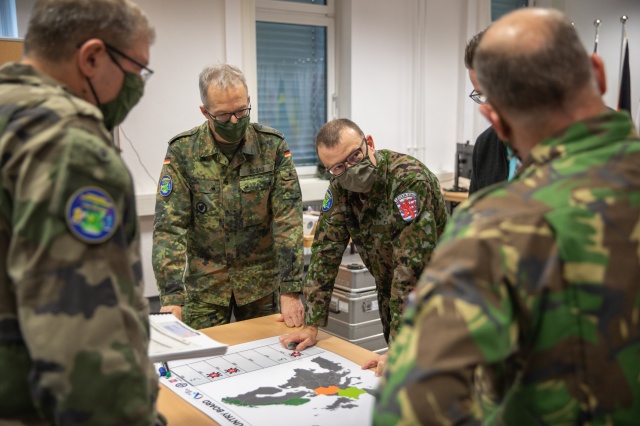 Soldiers from several nations stand around a table with a map of Europe on it.
© Bundeswehr/M. Dittrich
Soldiers from several nations stand around a table with a map of Europe on it.
© Bundeswehr/M. Dittrich
Formalized Cooperation
In the last year, we finalized our cooperative efforts through an Exchange of Letters (EOL) with the EUROPEAN EXTERNAL ACTION SERVICE - European Union Military Staff and HEADQUARTERS ALLIED POWERS EUROPE. Now it is our aim to fully energize this EOL via regular staff talks between SHAPE and EUMS Medical Advisor and projects. Based on staff talks of NATO MILMED COE and MMCC/EMC, detailed working relationships and delineation of tasks of both organizations were developed and were finally signed by both directors on the 18th of March 2021. Both organizations, NATO Military Medical Centre of Excellence (MILMED COE) and MMCC/ EMC, advise NATO Command Structure (NCS) in their area of expertise. The MMCC/EMC will focus on operational level functions in close connection with SHAPE and its subordinate commands. The NATO MILMED COE and the MMCC/EMC work in a complementary and coordinated manner to concentrate eff orts and resources to the benefi t of the medical support of our forces in the best and most effi cient way. The Program of Work of both entities are coordinated and harmonized to complement each other’s work. During the last year, the director of the MMCC/EMC was invited to provide an update of the MMCC/EMC for the Military Committee of EUMS and NATO HQ and European Parliament’s Subcommittee on Security and Defence (SEDE).
Response to COVID Pandemic
Throughout the pandemic, the MMCC/EMC focused on strengthening its coordination role and increasing the readiness and resilience critical for an eff ective pandemic response. We can only beat the virus and confi ne its consequences by cooperating across borders. It is obvious that multinational solutions are required to end this pandemic. The crisis has shown that our nations are resilient but will be even more resilient if working together.
The MMCC/EMC used its established network generating links between health services for questions about aeromedical evacuation and the provision of medical equipment for example. As the CORONA pandemic has proven once again, there are strong interdependencies between the civilian and military medical stakeholders in all NATO and EU nations.
In April 2020, NATO’s Euro-Atlantic Disaster Response Coordination Centre (EADRCC) asked the MMCC/EMC to develop the NATO COVID Trust Fund medical stockpiling concept on short notice. The first donations toward the stockpile were distributed by NATO HQ to nations in need to lessen the effects of the pandemic. Based on these experiences, the MMCC/EMC have extended that medical stockpiling concept to the so called Military Modular Multipurpose Epidemic/Pandemic Stockpiling (M3-EPS) Concept, which is accessible to EU and NATO nations and medical stakeholders. As a surge capacity, rapidly deployable and modular standard packages of medical materiel have been identifi ed and defined for stockpiling. The modular standard packages can be used to support both, military and civilian medical facilities. For example, the bilateral support that the Bundeswehr Medical Service provided to Portugal included the deployment of ICU capability utilizing the principles of the M3-EPS. In parallel, the MMCC/ EMC has started to exchange information regarding stockpiling efforts with DG SANTE and DG ECHO (more details about this concept, page 20).
Another contribution in response to the COVID-19 Pandemic is the exercise RESILIENT RESPONSE 2020 (RERE 2020). This war game was organized by MMCC/EMC in close cooperation with the Hybrid Centre of Excellence (CoE) and the German Federal Office of Civil Protection and Disaster Assistance (BBK). The purpose of RERE 2020 was to provide an interdepartmental, cross-sector, multinational epidemic/pandemic war game, with the aim to train decision-making for a mainly strategic leadership. It simulated a crisis environment with a focus on European countries. (more details about this wargaming, page 16).
Both projects were achieved in close cooperation between NATO and the EU. As a young organization, the MMCC/EMC will continue to support the diff erent eff orts of NATO and the EU. MMCC/ EMC has initiated projects, which are providing multinational solutions for outbreak response.
Medical Forces Building and SOP Library
The Very High Readiness Joint Task Force (VJTF) Land Brigade 2023 for the NATO Response Force (NRF) consists of troops from eight nations with Germany, the Netherlands, and Norway serving as the Lead Nation Group. In support of the Lead Nation Group, the MMCC/EMC was asked to serve as the lead of the Multinational Medical Working Group, the steering element responsible for coordinating multinational medical support for the VJTF brigade. This brigade constitutes the spearhead of the NRF. The initial focus of the MMCC/EMC was the development of the brigade’s multinational medical task force and to resource the multinational Role 1 medical support. As a result, multinational medical contributions have been integrated and harmonized to a powerful medical task force consisting of units, subunits, or personnel from various nations. The success of the multinational medical task force is a direct result of those nations already contributing to the MMCC/EMC and reconfi rming the requirement for a multinational approach to medical support.
Building upon the multinational medical task force, the MMCC/ EMC developed the multinational medical concept that describes the medical procedures, responsibilities, and collaborative relationships in a multinational environment. It can be used as a blueprint for other nations and medical lead units in the future. MMCC/ EMC’s quick development of the concept is a benefi t for not only the NRF but also the contributing nations of the MMCC/EMC.
An additional example of increasing interoperability and readiness is the creation of a SOP library as a mission memory. We do not want to reinvent the wheel. Moreover, it is our aim to collect generic SOPs, references and examples from recent and current missions, operations and exercises, to establish a basis for future deployments in a permanent platform to share data and information. The MMCC/EMC off ers a coordinative support to the individual capabilities provided by the troop-contributing nations to establish a Multinational Medical Task Force in order to improve readiness and responsiveness. The MMCC/EMC will be able to build on these examples and experiences multinational medical units or taskforces as a basis for future deployments with shorter preparation time.
Biosensors supporting Healthcare in Missions
The COVID-19 Pandemic demonstrated the increasing relevance and demand for Tele-Health to meet critical health needs while reducing exposure. Additionally, the advantages of utilizing wearable biosensors to support healthcare in missions have become more apparent in recent years, leading the military medical services of several nations to implement various solutions in the near future.
Together with the NATO COMEDS Tele-Health Team (HIST WG), the MMCC/EMC is organizing and hosting a virtual workshop on Biosensors supporting Healthcare in Missions on May the 18th through May 20th 2021. The chairman of the NATO COMEDS Tele-Health Team (HIST WG), LTC Prof Scheid, is the scientific advisor for the workshop.
The three programme clusters take great care to present a well-balanced and informative agenda. The fi rst cluster and day is about the implementation of Biosensors supporting Human Performance and Soldier / Warfighter Readiness. The second day focuses on the use of Biosensors in missions - Health and Medical Management Applications. There will be presentations about Biosensors in supporting triage situations and improving medical awareness during missions for example. On day 3, various considerations in wearable biosensors will be explored to include ethical, legal, and chemical-biological-radiological and nuclear (CBRN)-related concerns.
Conference participants include subject matter experts from national and international institutions to include the Johns-Hopkins-University, Fraunhofer Institute for Manufacturing Engineering and Automation, British JHUBMED, COMEDS, Swiss Center for Military Medical Ethics (University of Zurich), and the Netherlands Organisation of Applied Scientifi c Research (TNO).
The finalized programme includes 30 Speakers from 17 nations (AUT, BEL, CHE, CZE, DEU, ESP, EST, FIN, FRA, GBR, GEO, HUN, ITA, NLD, SVK, SWE, USA). Around 90 participants have signed in to join this event.
The objective of the MMCC/EMC is to bundle knowledge and consolidate the understanding of this important field. Our goal is the creation of a Community of Interest in Telehealth and especially in Wearable Technology. Depending on the future developments, the mid-term aim of the MMCC/EMC is to develop a Tele-Health- Hub together with COMEDS Tele-Health Team (HIST-WG).
Wargaming Resilient Medical Interface 2021
During the past few months, the MMCC/EMC developed and implemented a series of wargames which included extensive external participation. Filling an identifi ed gap in multinational medical support, participating nations have asked that the MMCC/ EMC continue the wargarming series. During 2021, the MMCC/EMC’s warming eff orts focus on the training and exercising of the MMCC/EMC´s Standing Operational Procedures and its capability as a multinational coordination element, including medical hybrid threats. The main aim of the exercise is to integrate the participating nations into the coordination process of the MMCC/EMC and using the SITCEN.
The scenario is a No armed conflict - a crisis on NATO’s flanks combined with Hybrid threats. “Shocks” and crisis-like developments with medical focus request for civilian-military and supranational coordination.
We would like to advance the correlation between medical resilience and deterrence including a strong EU and NATO Medical Civ-Mil Interface. In this wargame, we will increase the attention of the MMCC/EMC to its coordinating function with military and additionally civilian health services and organizations. The new project is called Resilient Medical Interface (REMI) 2021. The key challenge will be, that the MMCC/EMC will the organizing and facilitating element for the wargaming on the one hand and in parallel play the role as the primary training audience. The wargame REMI21 will be an important part of our evaluation for the Full Operational Capability (FOC) of the MMCC/EMC and to fully implement the concepts and strategies the MMCC/EMC have been developing over the past months.
SUBSTANTIAL NATO-GEORGIA PACKAGE (SNGP)
“The Defence and Related Security Capacity Building (DCB) Initiative reinforces NATO’s commitment to partners and helps project stability by providing support to nations requesting assistance from NATO. DCB helps partners improve their defence and related security capacities, as well as their resilience, and, therefore, contributes to the security of the Alliance. Five DCB packages have been launched thus far. The DCB package for Georgia was agreed in 2014 at the Wales Summit and intensifi ed in 2016 at the Warsaw Summit. It is provided through the currently adapted Substantial NATO-Georgia Package (SNGP), which includes support in a wide range of areas” (https://www.nato.int/cps/en/natohq/), like for example medical capability, Special Operations Forces, military police, maritime security or air defence.
Based on a request of NATO and supported by the NATO Member Nations, the MMCC/EMC will have a leading role and provide its medical operational expertise and SMEs for to meet medical requirements of the SUBSTANTIAL NATO-GEORGIA PACKAGE (SNGP). The MMCC/EMC initiated the medical aspects of the project in February 2021 via initial communications with the NATO Core Team in Tbilisi, responsible for coordinating the implementation of the package. The MMCC/EMC is very careful to align the SNGP efforts with those of other nations within Georgia as to not duplicate efforts while enabling Georgia to achieve their stated goals.
Summary
The MMCC/EMC has delivered valuable support to EU and NATO initiatives over the past few months via the delivery of medical subject matter expertise, medical resilience and civil-military cooperation, medical wargaming, telehealth and wearable biosensor initiatives, and capability monitoring and development.
The MMCC/EMC is ready and able to support with mission and operational impact NATO and EU via its operational knowledge and capabilities to the benefi t of the health of our soldiers by combining ‘Eff orts in Medical Support’ The MMCC/EMC will be busy over the next few months developing processes necessary to achieve FOC status for Medical Crisis Response. The fi nal FOC criteria are in development together with the Steering Committee of the MMCC/EMC. In this process, the wargaming REMI 21 will be an important milestone.
The MMCC/EMC provides a bridging function between EU and NATO for military and civilian medical stakeholders. MMCC/EMC strives to grow as a lighthouse project of EU/NATO cooperation and coordination in a functional domain, by combining the NATO FNC and the EU PESCO projects in one entity effi ciently and successfully.
Date: 10/07/2021
Source: EMMS 2021







